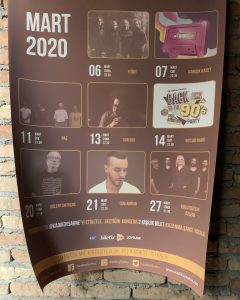AYŞEN GÜVEN
In the second part of our article series “Musicians Speak: Pandemic, Loneliness, Solidarity”, our guest is Serkan Fidan, manager, festival organizer and one of the operators of Kadıköy Sahne. Fidan, who has been involved in almost every field of the sector for many years; as someone who knows large productions and small organizations from planning, backstage, stage to box office. And of course he has been unemployed for months. Its venue, Kadıköy Sahne, is, in his own words, “a bit dusty.”
We talked to him about how he lives his life and the industry he knows very well. Fidan, who said, “If an attractive offer comes from a corporate firm today, I can consider it, but I can also apply for a job as a cashier at the market tomorrow,” Fidan states that the industry is in debt spiral, and that when these days pass, the balances will change. Saying that the industry is used to delays and cancellations, Fidan emphasizes that online organizations are not yet in a position to keep the industry alive.
This time, Serkan Fidan has the microphone.
Serkan, you have experience in almost every job of the music industry. Your concert venue has been closed for months, the festivals you have organized have been cancelled, and the musicians you work with cannot do business. How do you make a living?
Like everyone else, I am going through a tough time financially. In this period of over a year, I have made almost no money. We used the savings first. Then we owed money to friends. Finally we sold the car. Somehow we got this far. I’m still lucky.
For what do we consider ourselves lucky! Kadıköy Sahne, one of the most voluminous and few concert halls on the Anatolian side of İstanbul has been closed for months. When you can open is unknown. What is the current situation of the place? How long does it seem like you can resist?

The poster of the last program of Kadıköy Sahne, which could not be realized due to the pandemic.
I went for a shooting the other day, it’s a bit dusty. Since we are a performance venue that opens 2-3 days a week when our lives were normal, we are a business that has minimized the costs of being closed. In normal times, this was a disadvantage that increased our cost of opening the place compared to our counterparts, now it has turned into a bit of an advantage. However, it is a situation that have more holes than swiss cheese. We are people who think that nothing is more important than human health. We are not allowed to do business for over a year. No problem, if we are going to make a small contribution to preventing people from dying from this virus, let’s not do business for this long more. However, I think that the state should guide a business that has kept its doors closed for so long with various decrees in paying its rent, bills, salaries, taxes and loans.
“I FEAR MORE FOR THE DEBTS WE WILL PAY WHEN WE OPEN”
How long can you resist under these conditions?
Since we could not open a single day in this process and we have nothing left, no creditor is in expectation anymore. We can resist, but there is a debt that is constantly rising. The debts that we will have to pay when we open scare me much more than the situation we are in.
What are the security, waiter, bartender, sound manager, light maker previously working there doing?
Since our place was only open 2-3 days a week, we preferred to employ daily insured rather than salaried employees. Therefore, almost all of our staff were students who worked with us to earn additional income or who wanted to earn their own pocket money. Our few full-time insured friends also benefited from the short-time working allowance. We haven’t even sat down and talked yet about what we are going to do next. We are going through ridiculous times. The employees of the venue don’t know whether to be upset with themselves or at the state of their boss.
Could art and art venues have survived without such damage during this period?
We see how strong economies and powerful states get over it. Businesses that are our equivalents in Europe receive regular support at a certain rate of their turnover, not one-time support. Thus, they can pay their rent, bills and salaries.
“PROFESSIONAL ASSOCIATIONS MUST CREAT AWARENESS; THEY MAY TAKE RESPONSIBILITY FOR CREATING PRESSURE ON POSITIONS”
You are a person who get under the skin of the sector, so to speak. Both the front of the stage, the backstage and the experiences of getting together. Professional associations were also very controversial in this period. What is your view on these discussions?
If we divide the music industry into live music and recorded music, the contraction in recorded music during the pandemic period is at tolerable levels. However, the live music industry shrank by 90%. This contraction is not sustainable. Professional associations also earn an income only from recorded music at this stage. In addition, they are obliged to distribute the revenues they collect to their members as written in their statutes. It is known that making aid campaigns is now the monopoly of the governorships. Therefore, it is not technically possible to provide concrete support to music workers who are not members of professional associations. But they can take responsibility for raising awareness and putting pressure on positions capable of creating inclusive solutions. As far as I can see, MSG (Musical Work Owners Group Professional Association) and MÜYORBİR (Music Interpreters Professional Association) spend a lot of time. MESAM (Turkish Musical Work Owners Professional Association) will take a more active role in the processes when the administrative gap is eliminated. For example, the support given by the Ministry of Culture was thanks to the serious work of the representatives of these professional associations. Although there were some problems in the setup of the work, I think it was the first and most comprehensive support program in this field.
Some online concert solidarity has been tried and continues. What are your observations on these efforts? And as someone who has been doing this with live stage organizations for years, I would like to learn how you found his digital concert and festival experiences.
First of all, online events are not yet mature enough to keep the industry alive. The number of tickets for these concerts was well below the standard, with a few exceptions. Since the sponsors designed events taking into consideration the number of views and followers, they could not take an inclusive approach. Local governments also remained clumsy. They do things that are unaware of each other and are disconnected from each other. Particularly, the municipalities representing the opposition parties could have made a great contribution to the solution if they acted with a common mind and a common cultural policy. I’m not mentioning about the state. The Ministry of Culture did not do anything until January.
On the other hand, I was very distant to online concert works. It seemed to me like trying to sell the air of Kaz Mountains in Kadıköy by putting them in bottles. Actually, I’m still distant, but Milyonfest Online, which took place in January, broke my prejudices a little. However, online concerts are not likely to be a solution to the industry’s problems. Let me give an example: The Moğollar were a band that gave 60-70 concerts a year. In this new arrangement, they gave a total of two online concerts, one for the London Jazz Festival and the other for the Medicine Week event of the Istanbul Chamber of Doctors. We are talking about a thirty-one percent contraction, neither the musicians nor the team can make a living. The psychological benefit of online concerts is more than the economic benefit.
“WE ARE IN THIS SITUATION NOT BECAUSE WE ARE FRAGILE, BUT WE ARE NOT ALLOWED TO DO OUR JOB”
 So, is the pandemic doubly shocking for the music industry, because of the fragility or irregularity of this field; what exactly is it about?
So, is the pandemic doubly shocking for the music industry, because of the fragility or irregularity of this field; what exactly is it about?
When bad news hits the agencies, nothing will happen to the entertainment programs on the TV, to the football games, but the concerts will be canceled immediately. That’s why we are very well-trained. Ours is a highly resistant sector, not fragile. We are in this situation not because we are fragile, but because we are not allowed to do our job.
State representatives always talked about the fact that most of the economy, which is formed by the sector, is unregistered. Yes, there is a substantial amount of informal economy and employment in our sector. Most of the companies trying to exist in the sector are doing all kinds of tricks to show the taxes low. But there is a perception that those who remain unregistered gain millions. There is a much smaller economy and a ridiculous taxation equation around our industry. This equation does not allow companies to carry out their activities as they should. Zorlu PSM is one of the most corporate companies in the sector. You won’t find any unregistered activity there. Although the occupancy rate is quite high in almost all of the events they hold, Zorlu is a business that is constantly losing money.
“I CAN ALSO APPLY FOR A JOB AS CASHIER AT THE MARKET TOMORROW”
At this point, we see that the industry has stricken the bottom. How long do you think it will take to recover when the pandemic is over?
It will take some time to get back to how it was. Everyone is in debt spiral. Paying off those debts will not be easy. The balances in the industry will change.
Are you considering quitting these jobs?
I always thought of doing other jobs simultaneously, not quitting these jobs. But I never had the courage to get involved in things I didn’t know. Just before the pandemic, we decided to start the manufacturing business with friends I loved and trusted in Eskişehir. But that field is not going well either.
I never thought of quitting this job. But if an attractive offer comes from a corporate firm today, I think I can consider it, but tomorrow I can apply for a job as a cashier in the market. The same goes for everyone in this industry. We all have a limit to what we can stand and families to be liable to look after.





